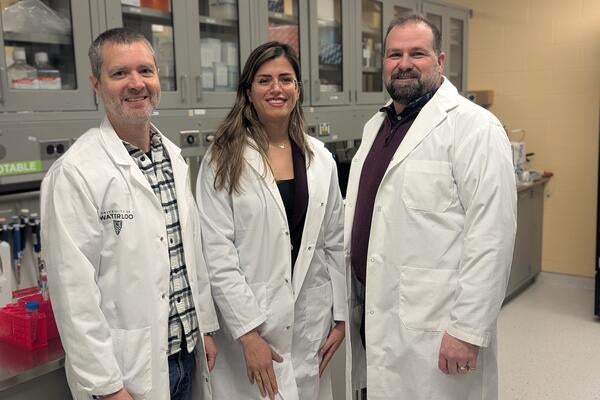
AI agrees with mom
Sophisticated text-mining analysis using artificial intelligence finds a strong link between feeling good and taking good care of yourself

Sophisticated text-mining analysis using artificial intelligence finds a strong link between feeling good and taking good care of yourself
By Brian Caldwell Faculty of EngineeringSophisticated analysis by Waterloo Engineering researchers using artificial intelligence (AI) supports the conventional wisdom that taking care of yourself makes you feel good.
In a study involving more than 700,000 online journal entries, the researchers found strong associations between positive moods and getting enough sleep, eating well and exercising.
Even activities such as getting a haircut or having a manicure were linked to feeling calmer and happier.
“What appears to work are simple things people can do for themselves, such as resting well, eating well, exercising, meditating, yoga,” says Lukasz Golab, a management sciences professor at Waterloo. “We shouldn’t forget about these things because they seem to make a real difference.”

Lukasz Golab is a professor of management sciences at Waterloo Engineering.
Anonymous journal entries used in the text-mining study were written by over 67,000 users of a mobile mood-tracking application. In addition to writing short entries, users recorded their moods from a list of 17 options.
Researchers built an AI computer model to identify words in entries associated with particular moods. They then analyzed surrounding words and phrases to try to understand the context.
“Word frequency doesn’t tell the whole story,” Golab says. “We needed another step in our methodology to recover the context in which a representative word was used.”
If the word ‘job’ was often used by people feeling stressed, for instance, the analysis would identify nearby words such as ‘busy’ and ‘overworked’ to help explain why people found their jobs stressful.
Golab says the strong associations between positive moods and taking care of yourself provide important insights for both individuals and governments.
“You may not be able to control the world around you, but you can control your lifestyle and your own good habits,” he says. “And in terms of public health, it is useful to confirm conventional wisdom with real evidence to make sound, data-driven decisions.”
Golab says technology at the heart of the study, which also found that more people reported feeling fatigued than happy, could be used as a screening tool to flag possible mental health issues in online social media posts.
“People seem to be busy and overworked and tired, and at some point chronic fatigue may actually become a public health problem that we should address as a society,” Golab says of the secondary finding.
The lead researcher on the study, Micro-journal mining to understand mood triggers, was former Waterloo graduate student Liuyan Chen. Her paper with Golab appears in the journal Computing.

Read more
Researchers engineer bacteria capable of consuming tumours from the inside out

Hand holding small pieces of cut colourful plastic bottles, which Waterloo researchers are now able to convert into high-value products using sunlight. (RecycleMan/Getty Images)
Read more
Sunlight-powered process converts plastic waste into a valuable chemical without added emissions

University of Waterloo researchers Olga Ibragimova (left) and Dr. Chrystopher Nehaniv found that symmetry is the key to composing great melodies. (Amanda Brown/University of Waterloo)
Read more
University of Waterloo researchers uncover the hidden mathematical equations in musical melodies
Read
Engineering stories
Visit
Waterloo Engineering home
Contact
Waterloo Engineering
The University of Waterloo acknowledges that much of our work takes place on the traditional territory of the Neutral, Anishinaabeg, and Haudenosaunee peoples. Our main campus is situated on the Haldimand Tract, the land granted to the Six Nations that includes six miles on each side of the Grand River. Our active work toward reconciliation takes place across our campuses through research, learning, teaching, and community building, and is co-ordinated within the Office of Indigenous Relations.